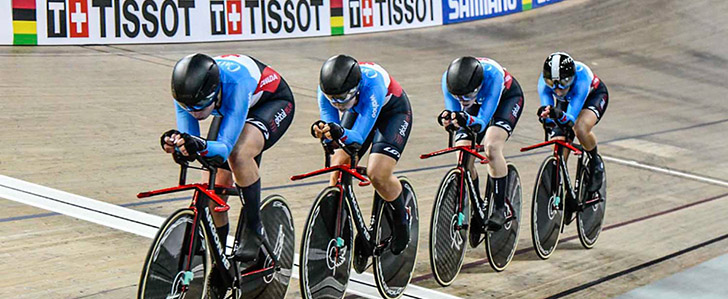June 8/11 12:33 pm - CC Reporting - An Op-Ed
Posted by Editoress on 06/8/11
This started out as a reply to a thread on the Forums - CC Reporting on Liberty Classic: Fail - which has developed into a good discussion, and that I'm glad to see happening. As it got longer, it turned into an Op-Ed piece. I encourage you to read the thread before continuing with this piece.
As Tracy noted in the thread, there are only the two of us, so we are limited in our ability to cover events by both time and cost. We do employ some freelancers, but that is also limited by cost and reliability - we have given many people an opportunity over the years (arranging press credentials, a place to stay, expenses, etc.), only to to have them fail to follow through. There are also so many events going on across the country (and riders competing internationally) at this time of year that it is not feasible to have a designated person for every event.
Therefore, for local events we rely on the organizers and you, the cycling community. I have consistently told anyone who has asked: "Yes, we will run your report on the local weekly time trial, trail day, your in-race blow-by-blow ... you just have to send it in. We will edit it and provide a promo for your club/team/sponsor in the process." Unfortunately, only about 1 in 50 actually do so.
Organizers are a bit of a hit-and-miss proposition for results and reports. Some are excellent, and recognize the importance of publicizing their event both before and AFTER. I recognize that at the end of a stress-filled and busy day, the last thing that an organizer (who, hopefully, broke even) wants to do is spend another hour sending out reports. The smart thing to do would be to designate a volunteer to do it - someone who wants the opportunity to try their hand at writing and/or photography.
We also run into a rather bizarre logic among some organizations that the results are 'theirs', and that 'we want people to come to our website'. I have actually received that comment more than once from groups as a reason why they do not send send out results. However, it is important for the event, the sponsors, the riders and their teams that information is disseminated as widely as possible. You are no more in the news business than we are in the event business.
I believe that local cycling is the life blood of our sport; it is where future stars come from, and allows us to empathize with the pros when we see them in the Tour. Cycling is one of those unique activities that you can do your whole life, both alone and as part of a community. With the increasing pressure on access to roads and trails, it is more important than ever that cycling publicizes its activities.
So again, I put it back to you: will you commit to providing your report on one event this year?
Now, as to the other aspect of the comments - investigative journalism.
There are some very articulate and thoughtful comments here. Would we like to do more? Definitely. Is it time consuming and costly? Definitely.
There is an interesting and disturbing trend happening in our sport, which has spread from others. This is the circling of the wagons by the more powerful entities in the sport, the increasing use of the media as a way to get a specific 'message' out and, unfortunately, threats and blackmail.
We are finding (along with other press) that gatekeepers are trying to restrict access to the people we want to talk to. This can include forcing all interview requests to go through a media person with the team to threatening and removing access to riders if you have published something the corporate side of the organization doesn't like. Lance Armstrong is the most extreme example of this - publish something that they [his organization] doesn't like and you will never get the chance to speak with him (or, when he was still racing, his team) again.
I don't have a problem with coordinating access through a spokesperson; it stops individuals from be pestered over and over again, and can be very efficient and appropriate at times. What I do have a problem with, is when the spokesperson becomes a way of restricting access to the 'right' people - ie, those who are cheerleaders, don't ask inconvenient questions, or who pay for the privilege (yes, that happens).
Individual athletes are also being more cautious about whom they will speak with and what they will speak about. Some might point to the proliferation of Twitter and other social media as increasing accessibility to athletes, but I disagree; this is marketing. I don't blame athletes from wanting to avoid dealing with difficult questions or situations - it is human nature - but their position dictates that they must deal with it, if they want to retain the trust and respect of the fans.
Fortunately, we have a good relationship with the Canadian riders and teams, so we can generally gain access (which sometimes involves circumventing the gatekeepers by the riders themselves). This is a give-and-take process: we will respect their privacy as much as possible (no gratuitous rumour mongering or invasion of their personal life), while they will be straight with us when we do need to ask uncomfortable questions.
We do not have the capacity to undertake investigations involving such things as doping in the European peloton nor, I believe, is that our mandate - we focus on Canadian issues. We did write about the situation in Burlington, more than once. We did not write about the team DQ at Killington, at the request of the team, who are trying to resolve this through official channels. We wrote about the real reasons that Quebec pulled their Worlds bid, and what is happening within mountain biking at the World Cup level. We have not written about the CCA for a while because, honestly, they are doing a much better job then they used to.
We have annoyed a number of people over the years, for writing articles that they don't like, ranging from inconvenient quotes by riders disparaging race courses, to riders changing teams, to the stories we have written about failings by organizations. However, as long as we have remained factual and impartial, we have still retained the respect and a good working relationship with those we need to interact with. If we lose that respect and credibility, then we know we are doing something wrong.
There was an interesting stat published recently, that said while people read Twitter, Facebook, blogs and other social media, they still reserve their trust for traditional news sources; the ones that actually research and proof content before publishing it, instead of just repeating what others are saying.
Hopefully, at the end of this long and somewhat rambling essay, you will have a better idea of what we do (and why), and some of the challenges we face. As always, comments are welcome on the Forums.
| Return to Canadian Cyclist homepage | Back to Top |





